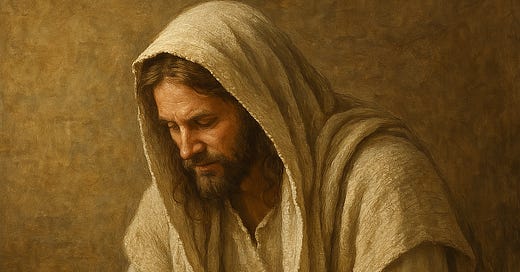"What Was Jesus Writing in the Dirt?A Hidden Message of Grace, Judgment, and Living Water in John 8"
Uncovering the Remarkable Connection Between Jesus’ Mysterious Writing, Jeremiah 17, and the Feast of Tabernacles
In John 8, we witness one of the most powerful moments in Jesus’ ministry—a woman caught in adultery, dragged before Him by religious leaders, and humiliated in public. Yet amid this drama, something seemingly small and mysterious happens:
“Jesus bent down and started to write on the ground with his finger.” —John 8:6 (NLT)
What was He writing?
This moment has captivated scholars, pastors, and believers for centuries. But when we zoom out and understand the context—both culturally and scripturally—the answer becomes more compelling than we might expect.
Jesus the Rabbi: Teaching Through "Remes"
Jesus was more than a rabbi, but He was a rabbi—and like many first-century Jewish teachers, He often used a method called "remes," meaning “a hint.” A rabbi would quote or reference a part of Scripture to bring the listener's mind back to an entire passage or message from the Old Testament.
In John 8, Jesus isn’t just doodling in the dirt. He’s drawing attention—through a “hint”—to something much deeper.
The Feast of Tabernacles: The Backdrop of Living Water
To understand John 8, we must first look at John 7:37-39, which takes place during the Feast of Tabernacles. This Jewish festival included the ritual of pouring water in the temple—symbolizing hope for God’s future provision and the coming of the Messiah.
On the last day of this feast, Jesus stood up and boldly declared:
“Anyone who is thirsty may come to me! Anyone who believes in me may come and drink! For the Scriptures declare, ‘Rivers of living water will flow from his heart.’” —John 7:37-38 (NLT)
In this moment, Jesus not only claims to be the source of living water, but also invites all who thirst to come to Him. But instead of being embraced, He is rejected by many.
The Woman, the Accusers, and the Dirt
Enter John 8. The religious leaders bring forward a woman caught in adultery—not to seek justice, but to trap Jesus. They reference the law of Moses and demand a judgment.
But Jesus doesn't answer right away.
He stoops.
He writes in the dust.
Then He stands and says:
“Let the one who has never sinned throw the first stone!” —John 8:7 (NLT)
Then He bends down again and continues writing.
The Key: Jeremiah 17 and the Four Variables
To fully understand what Jesus is doing, look at Jeremiah 17:13, a prophecy that includes four major elements—each present in John 8:
Water – "They have forsaken the Lord, the fountain of living water."
Rejection – "All who forsake you will be put to shame."
Shame – Those who turn from God are publicly shamed.
Writing in the Earth – "Their names will be written in the dust."
Now consider this:
The Feast of Tabernacles has just ended (symbolizing the water ritual).
Jesus declares Himself the Fountain of Living Water—and is rejected.
The religious leaders shame a woman in front of everyone.
Jesus writes in the dirt, likely recalling Jeremiah 17.
In other words, Jesus wasn’t writing randomly—He was indicting the accusers themselves with their own Scripture.
What Was He Writing?
Based on Jeremiah 17, and Jesus’ use of "remes," it’s possible—even likely—that He was writing their names in the earth, just as Jeremiah prophesied:
“Lord, you are the hope of Israel; all who forsake you will be put to shame.
Those who turn away from you will be written in the dust
because they have forsaken the Lord, the fountain of living water.” —Jeremiah 17:13 (NIV)
The oldest among them would recognize this reference immediately—and they begin to walk away, one by one, starting with the eldest (John 8:9). These were likely members of the Sanhedrin, Israel’s ruling religious council, familiar with this prophetic warning.
The Message of Grace
After the accusers leave, Jesus turns to the woman and says:
“Where are your accusers? Didn’t even one of them condemn you?”
“No, Lord,” she said.
“Then neither do I. Go and sin no more.” —John 8:10-11 (NLT)
Here’s the beauty of it:
The accusers left in shame.
The woman left in grace.
What This Means for Us
If you carry shame—from past mistakes, sins, or the judgment of others—know this:
Jesus does not shame you. He frees you.
He is the Fountain of Living Water. When others may try to define you by your past, Jesus redefines you by His grace. His message is the same today:
"Neither do I condemn you. Go and sin no more."
Final Reflection:
In a single act of writing in the dirt, Jesus condemned religious hypocrisy, fulfilled prophecy, exposed injustice, and extended mercy. The next time you feel accused or ashamed, remember:
Your name is not written in the dust.
It is written in the Book of Life.




